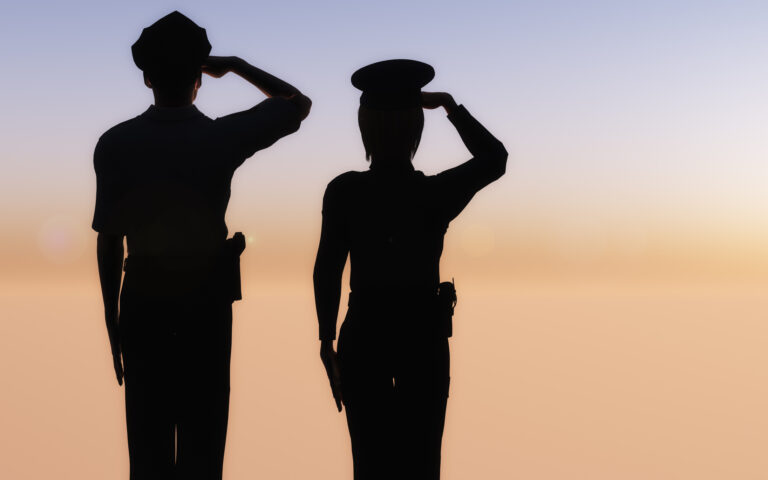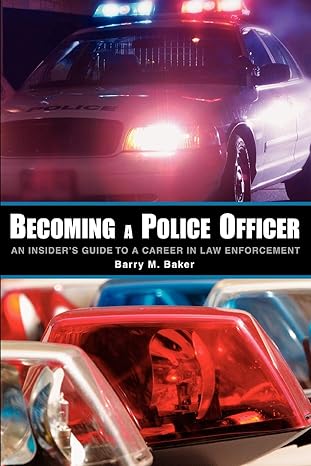
Keep this in mind. Even after six months of intensive police academy training, you’ll only be at the very beginning of a career long learning experience. You don’t want to become involved in any circumstances that could complicate your academy training.
~ Barry M. Baker Tweet

Detective Lieutenant Barry M. Baker (ret.) is a 32 year veteran of the Baltimore Police Department.
Once you’re accepted to the police academy, your department has every expectation that you will complete the training successfully based on testing and investigation. Therefore, you should not be apprehensive about your ability to successfully complete academy training.
Your entry to the police academy means you have successfully completed all of the pre-employment hurdles. Depending upon the scheduling of an academy class, you could begin the police academy prior to the completion of your background investigation. However, this is an exception to the rule.
There could be one bump in the road when it comes to firearms training. More than a few police recruits enter the academy with no prior experience in handling firearms. Again, if you’re one of these recruits, don’t be apprehensive. Your firearms instructors will provide any additional help needed to bring your firearm’s proficiency to an acceptable level.
Do Not Exercise Enforcement Action While In Training
Your entry into the police academy is a milestone in your pursuit of a police career. In fact, in some instances, you’re already a police officer vested with full authority under the law. You gained that status the day you took your oath of office. However, don’t take that status literally. You should reasonably avoid any situation which would require you to take any kind of enforcement action during your academy training.
The exception would be when you’re under the immediate supervision of an experienced police officer. I mention this because you could find yourself witnessing a circumstance where police intervention may be required. Short of an imminent life threatening situation, you should do what any concerned citizen should do; call 9-l-l.
When I and my classmates entered the Baltimore Police Academy, we were issued the standard police uniform with two exceptions: the trousers were khaki instead of the standard blue uniform trousers. Since it would be seven weeks before we would receive firearms training, the khaki trousers readily identified unarmed police recruits to other police officers as well as the public.
After seven weeks and our completion of firearms training, we were issued our police revolvers along with blue trousers. Even though we now looked like police officers, we still had four months of training ahead of us. The salient point here is that you should keep a low public profile during your academy training. Outside of training, you should not wear the uniform with the possible exception of commuting to and from the academy.
It’s Only the Beginning
Keep this in mind. Even after six months of intensive police academy training, you’ll only be at the very beginning of a career long learning experience. You don’t want to become involved in any circumstances that could complicate your academy training.
To say that your decision to insert yourself into an incident could complicate your academy training is an understatement. Consider your environment compared to mine when I was a police recruit. If I had taken action that turned out to be wrong, unnecessary, or embarrassing, there weren’t any number of digital devices recording me. My inexperience and lack of knowledge would not have been exposed to ridicule from thousands if not millions of people.
Police Academy Overview
The national average for police academy training is 21 weeks. Some will be shorter in duration with others as much as 27 weeks. Figure on spending 6 months in classroom and practical training instruction.
Generally, you’ll commute daily for training. The exception is state police academies which conduct their training on a more military style model. For example, if you’re attending the Massachusetts State Police Academy, you’ll reside on site in a dormitory and begin your day with a morning run at 5:30 am.
Your classroom instruction will last until 8:00 pm. You will get personal time from 8 pm until lights out a 9:30 pm. This will be your schedule Monday thru Friday.
More police academies are providing college credits for your classroom instruction. If you complete the Maryland State Police Academy, you’ll have 45 college credits toward a degree. That’s a big deal when you consider the cost of a four year degree.
Police Academy Classroom; Firearms, and Field Training
There’s a significant difference between a university environment and a training environment. The police academy is a training environment designed to provide you with as much training as possible crammed into a relatively short period of time. If you enter the academy with a preconceived notion of police work that runs counter to the training, you’ll only be doing a disservice to yourself. Keep an open mind and concentrate on retaining as much of the training as possible.
Classroom Training
There is no possible way for training alone to prepare you completely for all the variations of circumstances you’ll encounter as a police officer. However, training will provide the basis for you to analyze and adapt to ever changing situations and circumstances. For example, you’ll learn how to establish probable cause upon which you can make an arrest. Then there’s reasonable suspicion which is a standard less than probable cause which can, through succeeding events or investigation, rise to probable cause.
You’ll receive instruction about the administrative functions of the police department to which you must adhere. Most police recruits have no idea how much writing is awaiting them. Whether it’s on a computer screen or paper, you’ll be writing everyday of your police career.
Firearms Training
Most police departments issue magazine fed semi-automatic pistols of 9mm or .40 caliber with a capacity of 15 to 17 rounds of ammunition. In the early 1990’s these weapons began replacing the standard police issued .38 caliber six shot revolver as police began encountering more and more suspects armed with high capacity semi-automatic weapons.
You’ll find that police department firearms instructors are a particularly picky bunch. They’ll expect you to pay attention and follow instructions to the letter. They’ve established a training regime that leaves no room for debate. When it comes to firearms training, it’s about safety first and foremost.
Police Academy Field Training
A lot of police departments now incorporate the Field Training Officer (FTO) into your academy training on a more sophisticated level than in the past. Depending upon your police department’s FTO program, the FTO can have a significant influence over your successful completion of the police academy.
While the FTO is expected to evaluate your performance objectively, any one on one relationship can develop subjective measures. Even if you feel you’ve drawn the FTO from Hell, it will be your responsibility to develop and maintain a professional working relationship during your time together. Remember, you’ll be on your own soon enough.
Related Content for Police Academy
Advertisements


